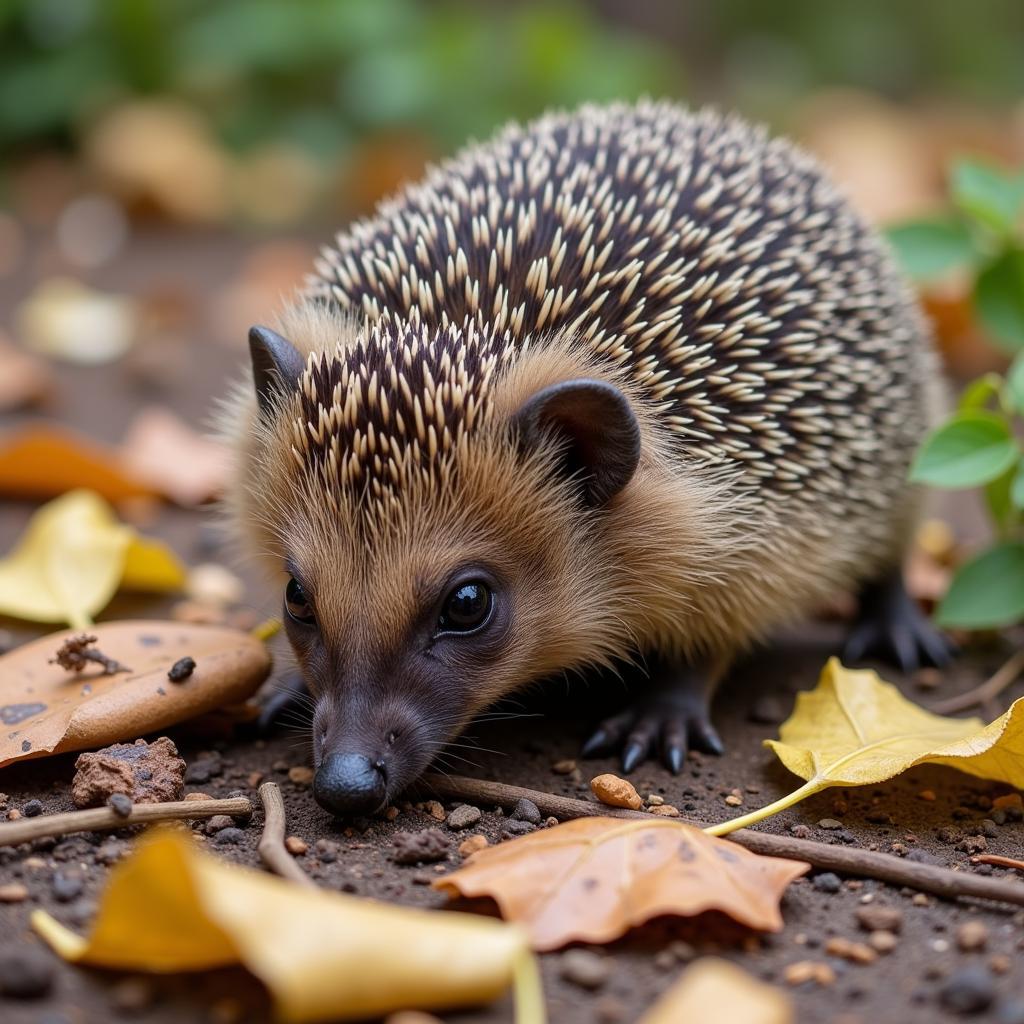The Ultimate Guide to an African Hedgehog Diet
The African hedgehog, a captivating creature native to parts of Africa, is becoming increasingly popular as an exotic pet. If you’re considering welcoming one of these prickly but adorable animals into your home, understanding their dietary needs is crucial. This comprehensive guide explores the ins and outs of an optimal African Hedgehog Diet, ensuring your spiky companion thrives under your care.
What Do African Hedgehogs Eat in the Wild?
In their natural habitat, African hedgehogs are opportunistic insectivores, primarily feasting on a delectable array of creepy crawlies. Their diet typically consists of:
- Insects: Beetles, caterpillars, grasshoppers, crickets, and worms form the foundation of their wild diet.
- Other Invertebrates: Snails, slugs, and earthworms provide additional nutritional variety.
 African hedgehog eating insects in the wild
African hedgehog eating insects in the wild
Replicating the Wild Diet in Captivity
While it might seem tempting to recreate their wild diet exactly, providing a solely insect-based diet for captive hedgehogs can be challenging. Thankfully, commercially available hedgehog food, combined with select fresh ingredients, can provide a balanced and nutritious diet.
The Cornerstone: High-Quality Hedgehog Food
The foundation of a healthy African hedgehog diet is a high-quality, commercially produced hedgehog food. Look for kibble formulated specifically for hedgehogs, ensuring it meets the following criteria:
- High Protein: Aim for a minimum of 30% protein, primarily from animal sources.
- Moderate Fat: Around 10-20% fat content is suitable for most adult hedgehogs.
- Low Fiber: Keep fiber content below 10% to avoid digestive issues.
- Limited Additives: Choose foods free from artificial colors, flavors, and preservatives.
Supplementing with Insects and Treats
While commercial food provides a solid base, supplementing with live insects and treats is essential for enriching your hedgehog’s diet and stimulating their natural foraging instincts.
Ideal Insect Choices:
- Crickets
- Mealworms
- Superworms (in moderation)
- Waxworms (as an occasional treat)
- Dubia Roaches
Frequency and Quantity:
- Offer a variety of 3-4 different insects 2-3 times per week.
- Adjust the quantity based on your hedgehog’s age, activity level, and weight.
Other Treats:
- Small amounts of fruits and vegetables (avoiding acidic options)
- Cooked, unseasoned lean meats (chicken, turkey)
- Hard-boiled eggs (in moderation)
Foods to Avoid
Certain foods can be harmful or even toxic to African hedgehogs. It’s crucial to avoid the following:
- Avocado: Contains persin, which is toxic to hedgehogs.
- Grapes and Raisins: Can cause kidney damage.
- Chocolate: Toxic to hedgehogs due to theobromine.
- Onions and Garlic: Can lead to anemia.
- Dairy Products: Hedgehogs are lactose intolerant.
- Sugary Treats: Can cause dental problems and weight gain.
Ensuring Proper Hydration
Always provide your hedgehog with a constant supply of fresh, clean water. Shallow ceramic bowls and water bottles with sipper tubes are both suitable options.
Monitoring Your Hedgehog’s Weight
Regularly weighing your hedgehog helps ensure they maintain a healthy weight. Sudden weight loss or gain can indicate underlying health issues and warrant a visit to an exotic veterinarian.
Frequently Asked Questions about African Hedgehog Diets
1. How much should I feed my African hedgehog?
The amount of food your hedgehog needs varies depending on factors like age, activity level, and metabolism. A good starting point is to offer 1-2 tablespoons of hedgehog food daily, along with a few insects several times a week.
2. Can African hedgehogs eat cat food?
While cat food may seem like a viable option, it’s not recommended as a staple food for hedgehogs. Cat food lacks the specific nutrients and balance required for their long-term health.
3. Why is my African hedgehog losing weight?
Weight loss can be a sign of various issues, including dental problems, parasites, stress, or underlying illnesses. Consult an exotic veterinarian to determine the cause and receive appropriate treatment.
4. Do African hedgehogs need supplements?
A high-quality hedgehog food typically provides all the necessary nutrients. However, you can offer a calcium supplement dusted on insects a few times a week to promote healthy bones.
5. Can I give my African hedgehog mealworms every day?
While mealworms are a good source of protein and fat, they should be offered in moderation as part of a varied diet.
Need More Information?
For further assistance with your African hedgehog’s diet or other care needs, contact us at:
Phone Number: +255768904061
Email: kaka.mag@gmail.com
Address: Mbarali DC Mawindi, Kangaga, Tanzania.
Our dedicated team is available 24/7 to answer your questions and provide expert guidance. You can also find additional helpful resources on african hedgehog habitat.
